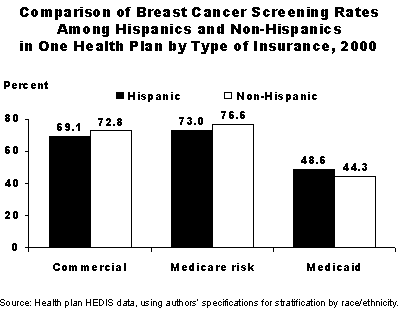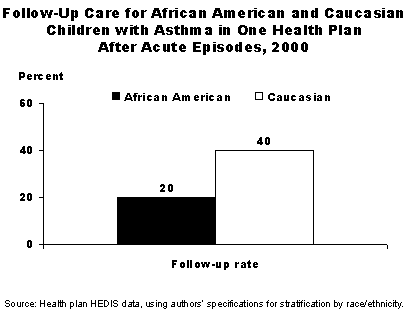Health plans can and should collect data on disparities in quality of care for racial and ethnic minority groups, according to a Commonwealth Fund report on a demonstration project involving eight managed care plans. The authors recommend that health plans collect racial and ethnic data preferably from plan members directly, or from existing sources, and that plans be required to collect and report these data in order to be accredited by the National Committee for Quality Assurance (NCQA) or the Joint Commission on Accreditation of Healthcare Organizations (JCAHO). Plans are currently not required to do so. The authors also recommend that standards be developed to indicate what magnitude of disparity should be cause for concern. Analysis of the health plan data revealed that disparities in care often existed between racial and ethnic groups, although minority patients sometimes received higher quality of care than whites, including in some Medicaid plans. "As the body of evidence on racial and ethnic health care disparities grows, health care leaders are eager to take concrete actions to eliminate disparities," said Karen Davis, president of The Commonwealth Fund. "Standards for collection and reporting of these data will allow health plans to design programs and practices that will improve quality of care for all their patients."

- In over half (52%) of the possible comparisons of Health Plan Employer Data and Information Set (HEDIS) measures within individual plans (77 of 148), disparities of 5 percentage points or statistically significant differences of smaller absolute magnitude were found.
- In one plan African Americans had lower rates of hemoglobin testing for monitoring diabetes than whites for 1998, 1999, and 2000.
- One Hawaii-based health plan found that Filipinos and Native Hawaiians had significantly lower rates of breast cancer screening than whites (72% and 75% vs. 81%).
- Not all of the disparities reflected better quality of care for the white patient population or for those in health plan commercial products. For example, in one plan, quality of care was higher for minority patients in the Medicaid product than in the commercial product.



